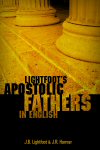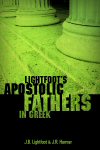Apostolic Fathers in Greek and English (Lightfoot Edition)
Digital Logos Edition
Overview
In this classic and highly influential collection, England's Lord Bishop of Durham, J. B. Lightfoot, focuses all scholarly attention on the Apostolic Fathers, while making the texts accessible to a broader audience. The Logos edition will be complete with Lightfoot's edition of the Greek, his English translation, and introductions.
How are the "Apostolic Fathers" different from the "Early Church Fathers?" In brief, the writings known as the Apostolic Fathers include only the texts thought to have been written by people who knew the Apostles or were one degree separated from them.
The Encyclopedia of Christianity explains the origins of the term thus, "The phrase 'Apostolic Fathers' goes back to a 1672 Paris edition prepared by J.-B. Cotelier entitled Ss. Patrum qui temporibus apostolicis floruerunt … opera. This work contained Barnabas, 1 and 2 Clement, the epistles of Ignatius and Polycarp, Martyrdom of Polycarp, and Hermas. Although the historicity is debatable, the phrase has secured a place in historical study. It now applies also to Didache, the Epistle to Diognetus, the Quadratus Fragment, and the fragments of Papias."
These early Christian writings shed light not only on theological developments, but on issues of canonicity, lexicography, and ecclesiology. They are cited extensively both in lexicons (e.g., BDAG and TDNT) and commentaries (e.g., NAC and WBC). BDAG, for example, contains nearly 2,500 references to the letters of Ignatius alone! Read more about the value of the Apostolic Fathers for biblical studies.

- Read Greek and English Translations side-by-side
- Search the Greek text by morphology
- Read insights on canonicity, lexicography, and ecclesiology
- Title: Apostolic Fathers in Greek and English
- Author: J. B. Lightfoot
- Editor: J. R. Harmer
- Translator: J. B. Lightfoot
- Publisher: Macmillan and Co.
- Publication Date: 1912
- Volumes: 2
- The Apostolic Fathers in English
- The Epistles of Clement of Rome
- The Epistles of S. Ignatius
- The Epistle of S. Polycarp
- The Martyrdom of S. Polycarp
- The Didache, or Teaching of the Apostles
- The Epistle of Barnabas
- The Shepherd of Hermas
- The Epistle to Diognetus
- The Fragments of Papias (not included in the Lake edition)
- The Reliques of the Elders Preserved in Irenaeus (not included in the Lake edition; appears with Papias Fragments and disclaimers in Holmes edition)
- The Apostolic Fathers in Greek
- The Epistles of Clement of Rome
- The Epistles of S. Ignatius
- The Epistle of S. Polycarp
- The Martyrdom of S. Polycarp
- The Didache, or Teaching of the Apostles
- The Epistle of Barnabas
- The Shepherd of Hermas
- The Epistle to Diognetus
- The Fragments of Papias (not included in the Lake edition)
- The Reliques of the Elders Preserved in Irenaeus (not included in the Lake edition; appears with Papias Fragments and disclaimers in Holmes edition)

The Apostolic Fathers in English
From the Preface: The text of the Epistles of Clement, Ignatius and Polycarp and of the Martyrdom of Polycarp is taken from Bishop Lightfoot’s larger work The Apostolic Fathers, Part I. S. Clement of Rome (2 vols., Macmillan & Co., 1890); Part II. S. Ignatius, S. Polycarp (2nd edition, 3 vols., Macmillan & Co., 1889). That of the Teaching of the Apostles was revised by him for this work. Mr Harmer contributes the text of the Epistle of Barnabas, the Shepherd of Hermas, and the Epistle to Diognetus. The Fragments of Papias and the Reliques of the Elders are taken from the printed editions referred to in each case.
The introductory material also contains an extract from the Last Will and Testament of J. B. Lightfoot

The Apostolic Fathers in Greek
In addition to having all of the contents as the English text, the Greek text is searchable by morphology. Morphological searches make it easy to look for particular forms, grammatical constructions, or combinations of terms and morph codes.
Dr. Joseph Barber Lightfoot was educated at Cambridge and Oxford, became the Lord Bishop of Durham in the church of England, served as a minister in St. Paul's Cathedral in London, and was Professor of Divinity at Cambridge University. He was also one of the original members of the New Testament Company of Bible Revisers. His other commentaries include volumes on Galatians and Philippians.
About J. R. Harmer
J. R. Harmer was the Lord Bishop of Rochester and Sometime Chaplain to the Bishop of Durham.
Reviews
5 ratings
Ashley Govender
5/6/2025

Andrew Heckmaster
3/2/2019

Jordan Furutani
9/24/2017

Dean Poulos
3/29/2016

David Roberts
9/17/2013